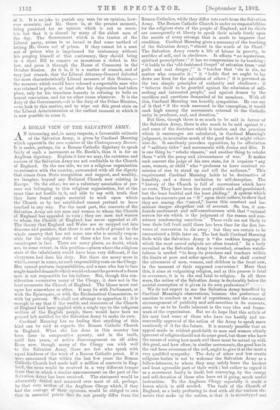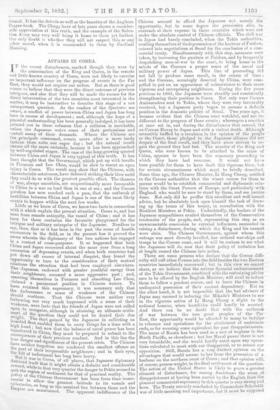A ROMAN VIEW OF THE SALVATION ARMY.
interest g and, in many respects, a favourable estimate AN of the S. lvation Army, is given by Cardinal Manning i.)which appea to the new number of the Contemporary Review. It is easier, perhaps, for a Roman Catholic dignitary to speak fairly of such a movement as Mr. Booth's, than it is for an Anglican dignitary. Explain it how we may, the existence and success of the Salvation Army are not creditable to the Church of England. On the one side, we see a religious organisation co-extensive with the country, surrounded with all the dignity that comes from State recognition and support, and wealthy, we imagine, beyond any National Church now existing in Europe. On the other, we see a voluntary association of per- sons not belonging to this religious organisation, but at the same time not hostile to it, and able to say with truth that they have found ample material to work upon which the Church as by law established cannot pretend to have touched in any way. For the most part, the converts of the Salvation Army are not men and women to whom the Church of England has appealed in vain ; they are men and women to whom the Church of England has never appealed at all. The theory that England and Wales are so mapped out into diocese's and parishes, that there is not a mile of ground in the whole country that has not some one who is morally respon- sible for the religious state of those who live on it, has no counterpart in fact. There are many places, no doubt, which are, to some extent, in this position—places where the religious state of the inhabitants would have been very different, if the clergyman had done his duty. But there are many more in which, except in name, no such responsibility rests on the Clergy. Men cannot perform impossibilities, and a man who has to face single-handed demands which would exh aust the powers of a dozen men is not responsible for his failure. But, though this con- sideration exonerates many of the Clergy, it does not in the least exonerate the Church of England. The blame must rest upon her somewhere or other. It may lie with Parliament, or with the Episcopate, or with the Ecclesiastical Commission, or with lay patrons. We shall not attempt to apportion it ; it is enough to say that if the wealth and resources of the Church of England had been applied with a single eye to the religious welfare of the English people, there would have been no ground left untilled for the Salvation Army to make its own.
Cardinal Manning has no feeling that anything of this kind can be said as regards the Roman Catholic Church in England. What she has done in this country has been done in comparative poverty, and in the teeth, until late years, of active discouragement on all sides. Even now, though many of the Clergy can wish well to the Salvation Army, there are few who speak with equal kindness of the work of a Roman Catholic priest. If it were announced that within the last few years the Roman Catholic Church had made half a million of converts in Eng- land, the news would be received in a very different temper from that in which a similar announcement on the part of the Salvation Army has been received. The statement would be alternately denied and mourned over most of all, perhaps, by that very section of the Anglican Clergy which, if they had the courage of their opinions, would be obliged to own that in essential points their do not greatly differ from the Roman Catholics, while they differ tote coelo from the Salvation Army. The Roman Catholic Church is under no responsibilities for the religious state of the people of England, and its chiefs are consequently at liberty to speak their minds freely upon the merits of every attempt that is made to improve that condition. Cardinal Manning gives a summary of the teaching of the Salvation Army, " almost in the words of its Chief." The Salvation Army exacts a life of labour in poverty, in sacrifice of self, and in obedience. It affects "no mysterious, spiritual prescriptions ;" it has no compromises in its teaching ; " it holds to the 'old-fashioned Gospel' of salvation from real guilt and real danger ;'" it " teaches that sin is sin, no matter who commits it ;'" it " holds that we ought to lay down our lives for the salvation of others ;" it is governed on the two simple principles of authority and obedience ; it " believes itself to be guarded against the admission of self- seeking and interested people," and against drones by the sacrifices and exertions demanded of its members. With all this, Cardinal Manning can heartily sympathise. He can say of it that " if the work answered to the conception, it would rank high among the movements external to the Catholic unity in prudence, zeal, and devotion."
But then, though there is so much to be said in favour of the Salvation Army, there is also much to be said against it ; and some of the doctrines which it teaches and the practices which it encourages are calculated, in Cardinal Manning's judgment, to neutralise much of the good that it might other- wise do. It needlessly provokes opposition, by its affectation of " military titles" and movements with drums and fifes. It is one thing to "rebuke sinners," and another thing to rebuke them " with the pomp and circumstance of war." It makes each convert the judge of his own state, for it requires " any man, woman, or child " who " professes to have received re- mission of sins to stand up and tell the audience." This requirement Cardinal Manning holds to be destructive of humility, and a direct invitation to self-deception. The "history of the Church is full of conversions which have no roots. They have been the most public and self-proclaimed, but the least fruitful and the least abiding." A system which makes its converts put an " S " upon their collars, to show that they are among the "saved," leaves this constant and im- minent danger altogether out of account. So, too, it con- founds excitement and self-consciousness with that " rational sorrow for sin which is the judgment of the reason and con- science condemning ourselves." These evils are not likely to bear their full fruit until there has been time for the first fer- yours of conversion to die away ; but they are certain to be encountered a little later on. The last fault Cardinal Manning finds with the Salvation Army is "the reckless language in which the most sacred subjects are often treated." In a body recruited as the Salvation Army is recruited, ceaseless watch- fulness is needed " to keep its preachers and teachers within the limits of pure and sober speech. But who shall control the utterances of men, women, and children in the front row, in the moment of their supposed conversion V More than this, it aims at vulgarising religion, and as this process is fatal to reverence, it is in the end fatal to religion. In. all these ways, the action of the Salvation Army is deplorably below the mental conception of it given in its own professions ?"
We do not expect to see the Salvation Army benefited by Cardinal Manning's observations, because the preference of emotion to conduct as a test of repentance, and the constant encouragement of publicity and self-assertion in its converts, seem to us to be faults inherent in the very idea and frame- work of the organisation. But we do hope that this article of his may lead some of those who have too hastily and un- reservedly approved of the action of the Army to speak more cautiously of it for the future. It is scarcely possible that an appeal made in evident good-faith to men and women utterly ignorant of religion should not do some good, but those who have the means of seeing how much evil there must be mixed up with this good, and how often, in similar movements, the good has in the end been overcome of the evil, ought to give it at the most a very qualified sympathy. The duty of other and less erratic religious bodies is not to welcome the Salvation Army as a fellow-labourer, to whom they may safely leave the hardest and least agreeable part of their work ; but rather to regard it as a movement faulty in itself, but conveying, by the energy and self-devotion of those who have set it going, much useful instruction. To the Anglican Clergy especially it reads a lesson which is still needed. The fault of the Church of England, as a body professing to deal with all the various ele- ments that make up the nation, is that it is stereotyped and
formal. It has the defects as well as the beauties of the Anglican Prayer-book, The Clergy have of late years shown a consider- able appreciation of this truth, and the example of the Salva- tion Artey may very well bring it home to them yet farther. Our only doubt is whether they will not suspect this or any ether moral, when it is commended to them by Cardinal Manning,































 Previous page
Previous page